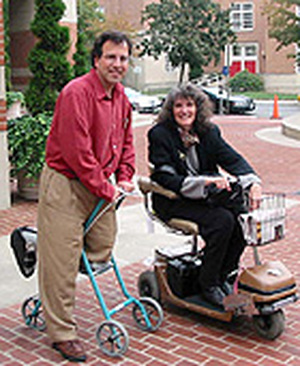Listening
comprehension exercise
National Public Radio Morning Edition: When
Walking Fails
reported by Joseph Shapiro
October 16, 2003
Click on the audio link on the following Web page to listen to the NPR report
(You will need to download the audio file to listen):
http://www.npr.org/features/feature.php?wfId=1466794
Vocabulary:
| Lisa
Iezzoni Harvard Medical School to be diagnosed with multiple sclerosis (MS) to practice medicine researcher Joseph Shapiro to cover disability issues temporarily to join the ranks of to break one's ankle Washington (D.C.) a sort of walking tour to cross a wide intersection Pennsylvania Avenue U.S. capitol to gleam in the distance to whiz across the street scooter-style wheelchair to be powered black batteries to rest under captain's chair to approach pavement to vibrate to keep up on four-wheeled walker "cool" to picture kid's scooter platform raised knee-high padded injured leg to push off device cheerful to comment on turquoise equipment metallic "hospital chrome" got it stylish users visible cobbles by law consumer demand |
Boston sidewalks corners curb-cuts to get around to be paved with cement smooth surface to be on the lookout for hazards roadmaps gap to trip s.o. up a stately look diabetes Parkinson's nerves in their feet sensitive to respond quickly  sensory impulses muscles and nerves to keep one upright to get a signal neurological disease to process more likely that to take a tumble elevator subway the Metro system Boston hardly accessible reliable to give priority to persons with a disability a tight squeeze one banana peel away from wet rock to slip for the time being accidents to make up a small...percent arthritis |
bad
back to account for subway street corner airport to direct her scooter pothole front wheel to tip one over rush hour traffic a certain nonchalance to come to to approach to deal with the unexpected sly subtle to feel on top of the world terrific to be flat on the ground to fall out from underneath you a grounding feeling to lose control to accept to put so much significance symbolic ladder to define ancestor brain size homo sapiens to struggle to walk canes crutches progressive chronic condition absolutely obvious to resist a symbolism of finality independence active federal research panel health care Chicago on business rehabilitation hospital tour to take off at top speed museum excerpt |
Listening comprehension questions:
1. What career did Lisa Iezzoni originally plan on? What did she later become instead? What is she doing now?
2. Why was the person who reported this story especially appropriate for the job when he did it?
3. Why does the host say "a sort of" walking tour? How does each of the two speakers get around for the tour?
4. What area of what region of the US are the reporter Joseph Shapiro and the interviewee Lisa Iezzoni touring?
5. Why have the designs of streets and buildings improved in terms of accommodating people with disabilities?
6. What design change in cities does Iezzoni say would make it much easier for the disabled to get around? What things does Iezzoni say are better in Washington than in Boston for people who have trouble walking?
7. Why do people with neurological diseases often have trouble negotiating brick and cobblestone streets?
8. What are the most common causes of walking disabilities? How common is the reporter's current reason for having trouble walking?
9. Describe the accident Iezzoni had with her scooter.
10. What does Iezzoni say about control, and what does she mean by "a kind of grounding feeling"?
11. What three English-language idioms does Iezzoni cite that refer to man's ability to walk? She says that the ability to walk on two legs was the key defining feature of what?
12. Why did Iezzoni resist using a wheelchair at first?
13. What was Iezzoni doing in Washington at the time of this interview?
14. Do you know anybody with a walking disability, temporary or otherwise? What does he or she have to say about how easy or difficult it is to get around in Taipei?
(Phonetics note: Note the way reporter Joseph Shapiro pronounces his /l/s— they are uvular, i.e. pronounced with the back of the tongue ¦Þ«á touching the uvula ¤p¦Þ instead of with the tongue tip touching the alveolar ridge¾¦Åi.)